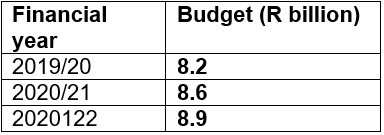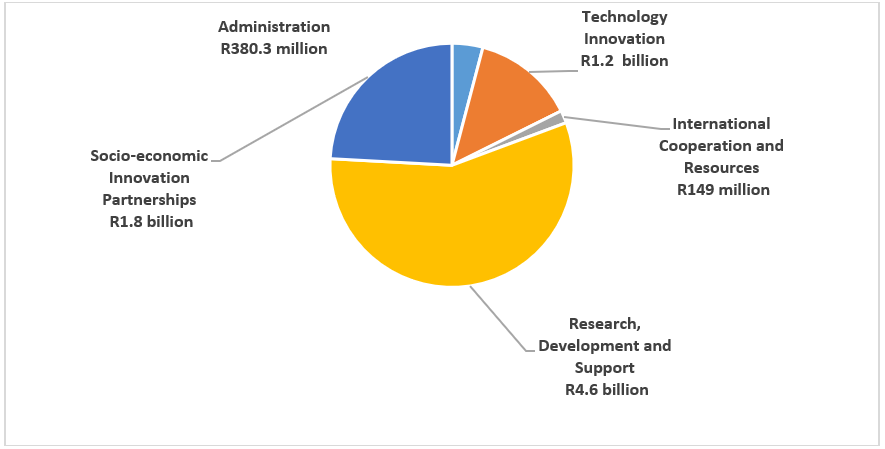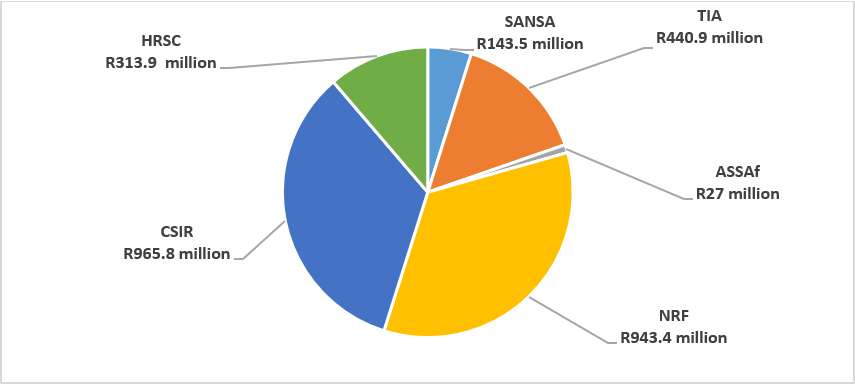Strategic overview
The 2019/20 Budget Vote takes place just a few months after the new White Paper on Science, Technology and Innovation was approved by Cabinet. The new policy document replaces the 1996 White Paper.
The new White Paper entrenches government’s commitment to the role of science, technology and innovation (STI), in economic and social development, and emphasises the core themes of inclusivity, transformation and partnerships.
The policy document will be accompanied by new implementation plans that will set out more specific areas in which government will focus its efforts to use STI to develop equitable social and economic advancement for South Africans is under development.
The plans are significant and embrace technologies of the Fourth Industrial Revolution.
STI is highlighted in South Africa’s National Development Plan (Vision 2030).
The National Development Plan (NDP), published in 2012, notes that developments in STI fundamentally alter the way people live, communicate and transact, with profound effects on economic growth and development.
STI are key to equitable economic growth, underpinning economic advances and improvements in health systems, education and infrastructure.
The department’s total budget is expected to increase from R7.8 billion in 2018/19 to R8.2 billion in 2019/20.
Cabinet has approved budget reduction on the department’s budget amounting to R264.8 million over the MTEF period.
These reductions will be affected on spending of goods and services, and on the baseline budgets of entities.
Some key priorities in 2019/20
Developing human capital
R2.6 billion has been allocated to Human Capital Development and Science Promotion.
The Department aims to assist 3 100 Phd students and 10 800 pipeline postgraduate students, 650 student graduates will also be placed in DST-funded programmes.
Highly skilled human capital is essential to developing a national system of innovation that is globally competitive and responsive to South Africa’s developmental needs.
Producing new knowledge
About 120 knowledge products are expected to be generated by the Technology Innovation Programme during this period.
With an allocation of R1.2 billion, focus will be placed on Bio-innovation, developing hydrogen fuel cell technology, renewable energy and energy storage applications.
Exploiting knowledge and innovation for inclusive economic development
The Department continues to invest in efforts to strengthen provincial and local innovation, as well as invest in knowledge and innovation that broadly supports economic development.
R1.8 billion has been set aside for this, and key areas of investment include advanced metals, advanced manufacturing, chemicals, agroprocessing, mining, water, sanitation and waste. Sector innovation and the green economy also receives a huge slice of this allocation.
Funding research, innovation and infrastructure
The department has allocated R4.6 billion to the Research, Development and Support programme to provide for research and development infrastructure across the national system of innovation.
These funds will be used specifically for the acquisition of research equipment, and the development of pilot plants, technology demonstrators, and specialised facilities such as aerospace.
During this period the completed 64 antennae MeerKAT array, will be enhanced through additional receivers and correlator installations.
Other major features include maintaining the number of research grants at 20 and maintaining the total available broadband capacity provided by the South African National Research Network to 3500 Gigabytes per second (Gbps).
Expenditure financing
Funding is allocated to the DST by National Treasury as part of the Medium-Term Expenditure Framework. For the 2019/20 financial year, the DST is allocated R8.2 billion.
The table below shows the resources allocated to the DST over the 2019 Medium Term Expenditure Framework period.
The Department also receives official development assistance from other countries through various funding instruments.
Functional classification of expenditure
The DST’s total budget for the 2019/20 financial year is R8.2 billion.
The chart below shows how this is divided between the Department’s five main Programmes, which represent various core focus areas.
Research Development and Support receives an allocation of R4.6 billion.
The Programme provides an enabling environment for research and knowledge production that promotes the strategic development of basic sciences and priority sciences areas, through the promotion of science, human capital development, and the provision of research infrastructure and relevant research support.
The programme will aim to award 9 300 bursaries to Phd students, award 32 400 bursaries to post graduates students (BTech,honours and masters), ensure the availability of and access to internationally comparable research and innovation infrastructure. It will also place 650 interns.
Socio-economic Innovation Partnerships receives R1.8 billion and will spend it on supporting the development of science and technology-based innovations for tackling poverty, including the creation of sustainable jobs and sustainable human settlements, and the enhanced delivery of basic services; providing policy, strategy and direction setting for the research and development-led growth of strategic sectors of the economy, and support for the transition to a green economy; leading and supporting the development of indicators and instruments for monitoring investments in science and technology and the performance of the national system of innovation, as well as ways of strengthening policy in relation to the system; and funding technology and innovation development programmes to advance strategic medium and long-term sustainable economic growth and sector development priorities, as well as public service delivery.
Technology Innovation receives an allocation of close to R1.2 billion to enable among others, research and development in space science and technology, energy security and the bio-economy, and indigenous knowledge systems.
As well as promote the protection and utilisation of intellectual property and technology transfer.
A big part of its work is supporting, promoting and advocating the development and translation of scientific research and development outputs into commercial products, processes and services that will contribute towards economic growth and better quality of life.
Administration receives R380.3 million for the overall management of the Department and to ensure that organisations funded by the DST comply with the standards of good corporate governance and align their activities with the strategic focus of the national system of innovation.
International Cooperation and Resources receives an allocation of R149 million to use for increasing the flow of international resources into the country for science, technology and innovation-based socio-economic development.
The allocation will also be used to increase the exposure of South African researchers and students to global knowledge and science, technology and innovation networks. It will also support capacity development in Africa to develop the continent’s knowledge-based economy.
Parliamentary grants for entities reporting to the Minister of Science and Technology
The National Research Foundation (R943.4 million) supports and promotes research through the funding of human resource development and the provision of facilities to enable the creation of knowledge, innovation and development in all fields of science and technology, including indigenous knowledge systems.
The Council for Scientific and Industrial Research receives (R965.8 million) to foster industrial and scientific development, particularly through multidisciplinary research and technological development, either by itself or in cooperation with public and private sector institutions.
The Human Sciences Research Council (R313.9 million) undertakes, promotes and coordinates policy-relevant, problem-oriented research in the human and social sciences, including research projects for public sector users, non-governmental organisations and international development agencies in partnership with researchers all over the world, but particularly in Africa.
The Technology Innovation Agency (R440.9 million) stimulates and intensifies technological innovation in order to improve economic growth and the quality of life of all South Africans.
The agency is key in ensuring the translation of the research and development outcomes of higher education institutions, science councils and public entities into commercial technology products and services, thus intensifying the impact of innovation on the economy and society.
The Academy of Science of South Africa (R27 million) carries out its mandate of promoting common ground across all disciplines; promoting innovative and independent scientific thinking; and providing effective advice and facilitating appropriate action in relation to the collective needs, opportunities and challenges of all South Africans.
The South African National Space Agency (R143.5 million) promotes the use of space and cooperation in space-related activities, while fostering research in space science, advancing scientific engineering through developing human capital, and providing support to industrial development in space technologies.
In addition to the parliamentary grants, the DST entities implement departmental projects through project funding.
Department of Science and Technology
Building 53, Meiring Naudé Road, Scientia Campus, South
Gate Entrance, Brummeria, Pretoria, South Africa
Private Bag X894, Pretoria, 0001
Tel: +27 (0)12 843 6300
Fax: +27 (0)12 349 1030
Website: www.dst.gov.za




 Publications
Publications
 Partners
Partners











